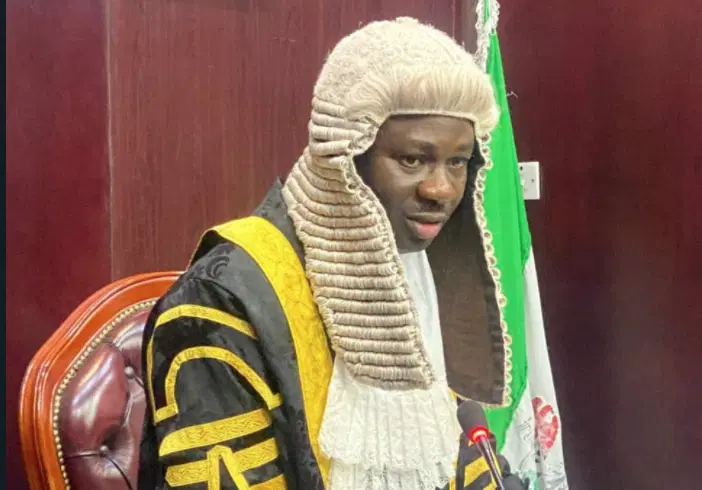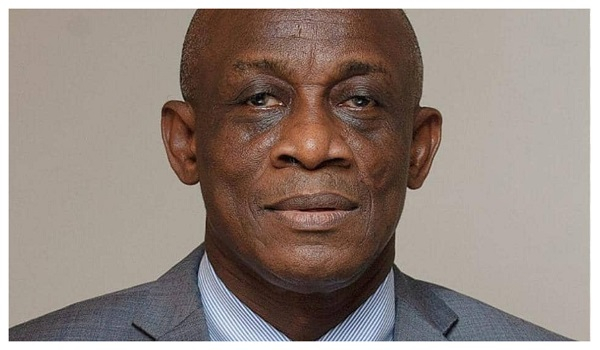NASS and politics of one-party state
From Adesuwa Tsan, Abuja
Since assuming office in May 2023, President Bola Ahmed Tinubu has guided the APC towards further political dominance, winning over opposition lawmakers, neutralising dissent within his party, and securing a stronghold across both legislative chambers. Today, the APC controls over two-thirds of state governors, the Senate and House of Representatives, along with the majority of Nigeria’s 36 state legislatures.
This dominance has not gone unnoticed but the President has justification for it, and assures that Nigeria will not become a one-party state.
While speaking at the APC National Summit on May 22, Tinubu attributed the growing support for APC to its outstanding achievements in less than two years in office. “A one-party system is not suitable for democracy. We are one party ruling and carrying on with the aspirations of Nigerians. You don’t expect people to remain in a sinking ship without a life jacket. I am happy with what we have accomplished and expecting more people to come; that’s the game,” the president said.
Earlier at a national caucus meeting in April, the president had explained that “Nigeria needs unity of purpose and a singular vision. When all arms of government are aligned under one progressive banner, we can achieve more for the people. Fragmented opposition has often been an obstacle to national development.”
At a May 1st press conference to mark Workers’ Day, he said, “some call it a one-party state. I call it political maturity. We are not stifling opposition; we are winning hearts and minds through good governance. If people are joining us, it is because they believe in what we are doing.”
The president’s remarks reflect a belief shared by many within the APC—that political homogeneity can streamline governance and drive development. Indeed, the Tinubu administration argues that a unified government can fast-track legislation, reduce policy gridlock, and ensure the effective implementation of its Renewed Hope Agenda. Leaders of the National Assembly have also echoed this belief. For instance, Senate President Godwill Akpabio, speaking at Ikot Ekpene township stadium, Akwa Ibom State, during his midterm empowerment outreach, noted that there is presently no vibrant opposition party to challenge the popularity of the ruling party.
“As I speak with you, there is nothing like a political party in 2027 in Akwa Ibom State again. For the Senate of Ikot-Ekpene Senatorial District, all political parties have collapsed to vote for Senator Godswill Akpabio. For the office of the governor in 2027, all political parties have agreed to vote for Governor Umo Eno. Akwa Ibom has moved to vote for President Bola Tinubu, Eno for Governor of Akwa Ibom State, and Senator Akpabio for Senate. The Peoples Democratic Party is in shreds and the umbrella can no longer protect,” the senate president said.
However, what observers fear is whether this path will lead to true development in national interest, or if it is masking a creeping authoritarianism that threatens the very foundation of Nigeria’s democracy. They argue that the Nigerian legislature, under the doctrine of separation of powers, is expected to act as a check on executive excesses as a watchdog of democracy. However, with the APC holding sway in both chambers, concerns about the legislature being a mere appendage of the executive have gained traction.
Dr. Chidi Odinkalu, a legal scholar and former Chairman of the National Human Rights Commission, warns of a dangerous erosion of democratic oversight. “When you have a legislature dominated by one party, especially one loyal to a strong executive, the concept of checks and balances collapses. Lawmakers become courtiers, not legislators,” Odinkalu said in a recent report.
Shehu Sani, a former lawmaker and vocal critic of authoritarian tendencies in government, also observed on social media, “A one-party legislature is not only unrepresentative, it is dangerous. It transforms the parliament from a people’s voice to a political choir.”
Indeed, the 10th National Assembly has so far displayed a pattern of swift passage of executive bills with minimal debate. In March, for instance, the National Assembly passed a controversial Finance Act amendment within 48 hours of its presentation by the presidency—despite public outcry over proposed tax hikes. But in contrast, it bid its time and did a thorough job on the highly controversial Tax Reform Bills.
Leader of the Senate, Opeyemi Bamidele has vehemently rejected the labelling of the National Assembly a rubber-stamp parliament, saying there is no justification or proof to that effect. He argued, “If we are actually a rubber-stamp parliamentary institution as most opposition political parties have claimed, the bills would have been passed within one week or two weeks after they were laid before us.
“In the process of passing the bills, both executive and legislative arms held over 39 engagements to trash grey areas in the Tax Reform Bills, 2024 before both chambers of the National Assembly eventually passed the bills.
“During this period, the engagements involved diverse interests and stakeholders across the federation. The tax reform bills could have been rushed within one or two weeks. But it took us six months to secure input from all critical stakeholders – civil society organisations, professional bodies, religious leaders and leaders of thoughts,” the senate leader added.
He further explained that if the National Assembly was actually a rubber stamp, it could have hastened the passage of the 2025 Appropriation Bills by the end of the 2024 fiscal year in order to sustain the January to December budget cycle, which had become the country’s practice in recent times. “We did not give the budget back to the executive until February 2025. We did a lot of due diligence. Every committee of the National Assembly duly engaged heads of agencies to properly scrutinise the budget also in the overriding public interest.
‘’We are working in the interest of the people. We are always taking into consideration the need to ensure good governance in all our undertakings and the need to use legislative frameworks to promote good governance in the federation,” Bamidele said.
In all these, the opposition remains defiant as its strength weakens. The Peoples Democratic Party (PDP), once Nigeria’s dominant party, now finds itself playing second fiddle. With internal divisions and electoral defeats weakening its structure, the PDP is struggling to mount an effective resistance within the National Assembly. Hon. Kingsley Chinda, Minority Leader of the House of Representatives and one of the few remaining vocal opposition figures, raised the alarm during a plenary session in May.
“We are seeing the deliberate shrinking of the democratic space. Cross-carpeting is now weaponised. Lawmakers are being enticed or coerced to join the ruling party, leaving little room for alternative voices,” Chinda said. He added that a legislature without opposition is akin to a courtroom with only the prosecution present—a one-sided process that ultimately fails the people.
The Labour Party (LP), which gained significant traction during the 2023 elections largely due to the candidature of Peter Obi, also voiced its concern over the development. Senator Ireti Kingibe of the LP lamented during a recent Senate briefing that “The APC is not just consolidating power—they’re eliminating dissent. This is not healthy for a democracy that is still growing.”
While critics decry the erosion of opposition power, some lawmakers believe the root of the problem is Nigeria’s multi-party political structure. Patrick Ndubueze, an APC lawmaker and veteran of Nigeria’s Third Republic legislature, offered a layered view during a recent discussion with Daily Sun.
“Because of the nature of politicking in Nigeria, I’ll say it two ways. I’m happy we’re in a multi-party democracy because it allows us to midwife our bills and ensure they become law. But I’ll also say this: what Nigeria really needs is a two-party system supported by independent candidacy.”
He argued that the current proliferation of parties encourages defections and dilutes ideological clarity. “With two strong parties and room for independents, you eliminate opportunistic defections. Lawmakers won’t jump ship for convenience. The arguments will be robust, the bills more refined, and the legislative process more qualitative,” Ndubueze noted.
Drawing from his early political career under the two-party structure introduced by General Ibrahim Babangida in the early 1990s, he added: “IBB was thoughtful. He gave us a two-party system that had structure. That system was better suited for Nigeria. Today, if we must reform democracy, I would recommend a strong two-party system backed by independent candidacy. That way, if you don’t agree with either party, you run on your own terms.”
Ndubueze expressed support for APC’s growing numbers but maintained his belief that a better democracy would emerge from structural reform rather than party hegemony.
But Tinubu has countered critics, saying democracy is not under any threat. According to him, politicians changing party affiliation is not new or peculiar to Nigeria and can be seen in more advanced democracies, where there are ready examples of notable politicians, statesmen and women who changed their parties. In any case, he added, all Nigerians are free to associate as they please.
The president, via a statement issued by his spokesman, Bayo Onanuga, wondered why the defection of people like the immediate past governor of Kaduna State, Mallam Nasir El-Rufai, to the Social Democratic Party (SDP) should be celebrated, while those of some members of the opposition to the ruling party should be condemned.
“Nigerians migrating to the APC and expressing support for Tinubu are doing so out of their free will, based on the belief that the reforms being executed are in the interest of Nigerians and the unborn generation. It is a gross disservice to democracy in itself for these emergency defenders of democracy to delegitimise the political choices of some Nigerians while upholding the choices of others to form a coalition against Tinubu and APC,” he stated.
As the opposition struggles within the legislative framework, civil society and the media are stepping up as watchdogs. Non-governmental organisations like BudgIT, SERAP, and Enough is Enough Nigeria have ramped up efforts to track legislative performance and hold government accountable. Hamzat Lawal, founder of Follow The Money, emphasised the importance of non-partisan activism. “We must not leave governance to the politicians alone. A one-party state thrives where the people are silent. We are not silent,” Lawal said.
With the 2027 general elections still two years away, the trajectory toward a one-party state seems likely to continue unless disrupted by significant political realignment or public backlash. Already, there are murmurs of a grand opposition coalition is in the offing—a coming together of the PDP, Labour Party, NNPP, and smaller parties to resist APC’s spread. But such alliances have failed in the past due to ideological incoherence and leadership tussles.
In the meantime, political observers noted that Nigeria’s legislature risks becoming an echo chamber, devoid of the vibrant debate and robust oversight needed in a functional democracy, if the one-party structure is allowed to flourish. As Professor Remi Sonaiya, a former presidential candidate, succinctly put it: “Democracy dies not when soldiers march into parliament, but when legislators stand and salute the president instead of holding him to account.”










